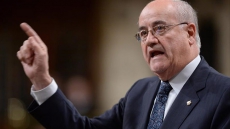OTTAWA - Canadian soldiers appear to be more likely than their civilian counterparts to have experienced abuse, including corporal punishment, or to have witnessed domestic violence as children, new research aimed at exploring the incidence of depression and suicide in the military suggests.
The as-yet-unpublished findings by health researchers at the Department of National Defence are contained in an internal abstract — an abridged sample of the results — that was recently delivered as a presentation to mental health professionals.
The research was carried out by the department of psychiatry at the University of Manitoba and the Canadian Forces Directorate of Mental Health.
Although the data is still being studied, preliminary results suggest 39 per cent of military members had been slapped or spanked more than three times as children; comparable research on the general population indicates some 22 per cent of civilians had the same experience as kids.
Seventeen per cent of military members reported having been thrown, pushed or grabbed more than three times as children, compared with 11 per cent of civilians.
Among military respondents, 15 per cent reported being kicked, bitten, punched, choked, burned or attacked as youngsters, compared with 10 per cent of civilians, while 10 per cent of soldiers also reported witnessing "intimate partner violence" while growing up. In that category, the civilian figure was eight per cent.
The study relies on data in the mental health portion of the 2012 Canadian Community Health Survey, which questioned more than 25,000 people, and the 2013 Canadian Forces Mental Health Survey, which is based on responses from more than 8,100 members of the military.
The Canadian Press was denied a request for additional information beyond the abstract because the research has yet to be officially published. But Dr. Mark Zamorski, one of the study's co-authors, did say the conclusions mirror similar research in the U.S.
They're important in understanding why members of the Canadian military have a higher than average rate of depression, which is linked to suicide, Zamorski said.
"For reasons no one understands ... the people that end up being attracted to or choose military service — for whatever reason — have higher rates of exposure to childhood adversity than civilians, or people who don't elect to be in the military," Zamorski said in an interview.
"And given that childhood adversity is such a powerful risk factor for depression, and for suicidal thinking, suicidal behaviour and many other adverse health outcomes — that, I think, is an important piece of the picture."
Researchers "haven't dug deep enough yet" to fully understand the links, however, Zamorski cautioned.
"We'll know a lot more in a little bit of time," he said. "They were very preliminary numbers. If it didn't fit in with the larger narrative we saw elsewhere, we wouldn't have presented it."
In the U.S., a major 2013 study by the mental health research branch of the Veterans Administration, Duke University and the University of Alabama concluded that abuse, neglect and other childhood ordeals were major contributors to problems for soldiers later in life.
"These findings suggest that evaluation of childhood trauma is important in the clinical assessment and treatment of depressive symptoms and suicidal ideation among military personnel and veterans," said the report by Dr. Nagy Youssef.
In 2014, there were 19 suicides in the Canadian military, according to recently released figures. That's one of the highest levels in the past decade, surpassed only by 22 suicides in 2009 and 25 in 2011 — the final year of Canada's combat mission in Kandahar.
Much of the public attention in the aftermath of the Afghan war has been focused on post-traumatic stress, which counts depression among its constellation of symptoms.
Yet post-traumatic stress is thought to have played a role in only three of 10 suicides in the Canadian military last winter, according to a separate series of documents obtained by CP.
The military and the Harper government routinely underline the tens of millions of dollars in resources that have been poured into PTSD treatment and research. They're also quick to say the rate of military suicide is below the national average.
But underlying that is the extraordinarily high rate of depression within the ranks, estimated at approximately eight per cent in the last mental health survey.
The military's surgeon general, Brig.-Gen. Jean-Robert Bernier, told a Commons committee last year that the mental health of soldiers is an issue they're struggling to understand.
A lot more research is necessary, Bernier said.
"We haven't been able to pin it down to specific exposures in military life ... although there are all kinds of increased risk factors for depression because of military service."




